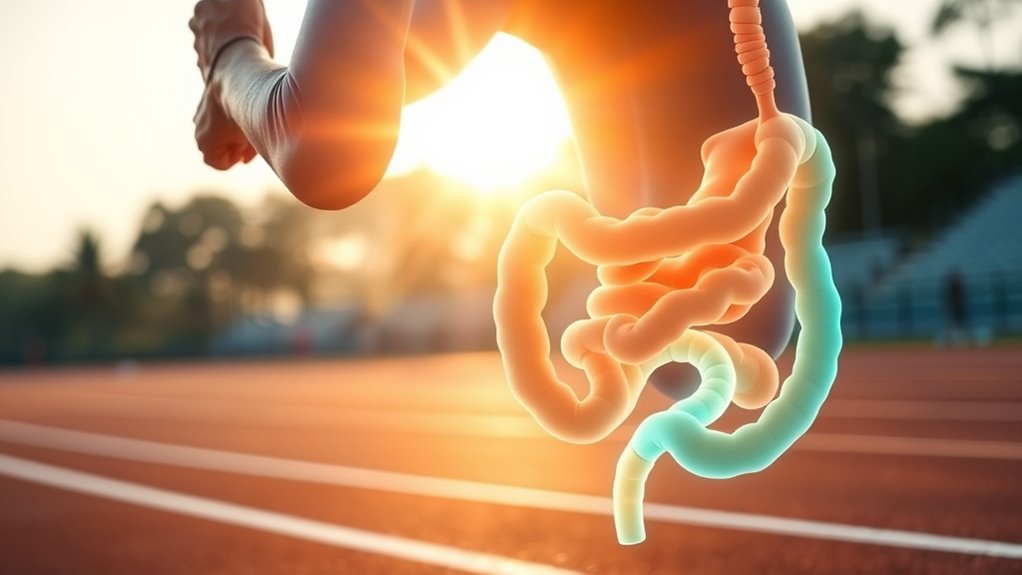Your gut health plays a vital, often overlooked role in athletic recovery. A diverse microbiome supports better nutrient absorption, reduces inflammation, and boosts your immune response, helping you heal faster after workouts or injury. Inflammation in the gut can hinder muscle repair and cause prolonged soreness. By focusing on a fiber-rich diet, fermented foods, and avoiding inflammatory foods, you can improve your recovery process. Keep going to discover how optimizing your gut can open your peak performance.
Key Takeaways
- A diverse microbiome improves nutrient absorption essential for muscle repair and energy replenishment.
- Gut health influences systemic inflammation, affecting recovery speed and soreness reduction.
- Fermented foods and fiber-rich diets enhance beneficial bacteria, supporting immune function during recovery.
- Reducing processed foods, alcohol, and NSAIDs minimizes gut inflammation that impairs healing.
- A healthy gut promotes better immune regulation, leading to quicker tissue repair and overall athletic resilience.

Your gut health plays a crucial role in how quickly your body recovers after exercise. When you’re pushing yourself during workouts, your digestive system endures stress, and the state of your microbiome directly influences how efficiently your body heals. A diverse microbiome, characterized by microbiome diversity, is essential for maintaining a balanced environment in your gut. This diversity allows for a broader range of beneficial bacteria that support nutrient absorption, immune function, and inflammation regulation. When your microbiome is rich and varied, your body is better equipped to handle the physical stress of training and recover swiftly.
A diverse microbiome enhances recovery by supporting nutrient absorption, immune health, and inflammation regulation.
Conversely, digestive inflammation can impair recovery. If your gut is inflamed, it hampers nutrient absorption, leading to deficiencies in critical vitamins and minerals needed for muscle repair and energy replenishment. Constant inflammation within the digestive tract can also trigger systemic inflammatory responses, which prolong soreness and slow down tissue regeneration. This creates a cycle where poor gut health hampers recovery, and inadequate recovery further destabilizes your gut environment, making it even more inflamed and less resilient.
To support your microbiome diversity, focus on incorporating a variety of fiber-rich foods, fermented products, and prebiotics into your diet. These foods nourish beneficial bacteria, promoting a healthy, diverse microbiome. Think of it as feeding the good bacteria that strengthen your gut barrier, reduce digestive inflammation, and improve overall gut function. When your gut is healthier, it can better regulate immune responses, reducing unnecessary inflammation that hampers recovery.
Moreover, managing digestive inflammation involves avoiding processed foods high in sugar and unhealthy fats, which can upset your gut balance and promote dysbiosis — an imbalance of gut bacteria linked to increased inflammation. Regularly consuming probiotics or probiotic-rich foods like yogurt, kefir, and sauerkraut can help restore harmony in your gut microbiome, lowering inflammation and supporting faster recovery.
In addition, staying properly hydrated and avoiding excessive alcohol or NSAIDs can prevent further irritation within your gut. When your digestive system is calm and functioning at its best, your body can focus on repairing muscles and replenishing energy stores instead of battling inflammation. Remember, a resilient microbiome and a less inflamed gut create an environment where recovery processes operate smoothly. By prioritizing gut health through diverse, anti-inflammatory foods and habits, you’re giving your body the best chance to bounce back stronger, ready for your next training session.
Frequently Asked Questions
Can Gut Health Influence Mental Resilience During Recovery?
Gut health can profoundly influence your mental resilience during recovery by strengthening the mind-body connection. A healthy gut produces neurotransmitters like serotonin, which boost your mood and reduce stress, helping you stay psychologically resilient. When your gut is balanced, you’re more likely to maintain focus and emotional stability, making it easier to bounce back. Prioritizing gut health enhances your overall recovery process by supporting both physical and mental well-being.
Are Specific Probiotics Better for Athletes’ Gut Health?
You might think all probiotics work the same, but for athletes, specific strains matter. Athletic strains like Lactobacillus and Bifidobacterium are tailored to support digestion, reduce inflammation, and boost recovery. Choosing the right probiotic strains can enhance gut health, giving you more energy and resilience. Don’t settle for generic options—opt for targeted probiotics designed for your athletic needs to maximize your performance and recovery.
How Does Hydration Affect Gut Recovery After Intense Exercise?
Hydration plays a key role in gut recovery after intense exercise. Proper electrolyte balance ensures your gut functions smoothly, preventing cramps and discomfort. Timing your hydration is vital; drinking fluids before, during, and after exercise helps maintain this balance. When you stay well-hydrated, your gut can recover faster, absorb nutrients more efficiently, and support your overall recovery process, making it easier to bounce back stronger for your next workout.
Does Gut Health Impact Injury Healing Speed?
A stitch in time saves nine, and your gut health plays a crucial role in injury healing speed. When your gut functions well, it boosts nutrient absorption and immune modulation, both essential for repair. Poor gut health can slow down recovery, leaving you vulnerable to further injury. Prioritizing gut health through proper nutrition and probiotics supports faster healing and keeps you in peak condition.
Can Gut Microbiome Diversity Predict Athletic Performance?
You might wonder if microbiome diversity can predict athletic performance. Research suggests that a diverse gut microbiome enhances nutrient absorption, reduces inflammation, and boosts immunity—all essential for peak performance. While it’s not a definitive predictor yet, maintaining high microbiome diversity generally supports better athletic outcomes. By focusing on a varied diet and probiotics, you can naturally improve your microbiome, potentially elevating your performance and overall recovery.
Conclusion
Think of your gut as the engine behind your athletic recovery. When it’s healthy, it fuels your body smoothly, helping you bounce back faster and stronger. Neglect your gut, and it’s like trying to run a race with a clogged engine—you’ll struggle and tire out sooner. Prioritize gut health with good foods and probiotics, and watch your recovery accelerate like a well-oiled machine. Your body’s best comeback starts from the inside out.










